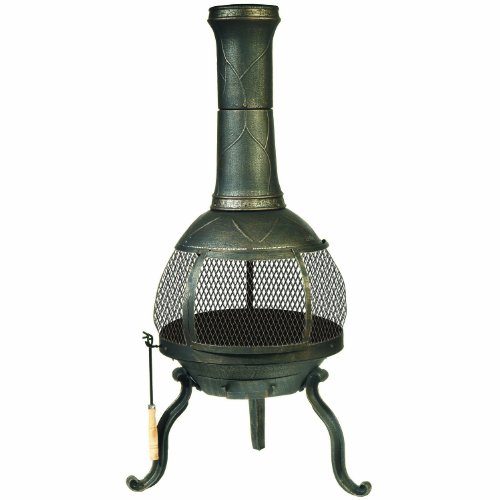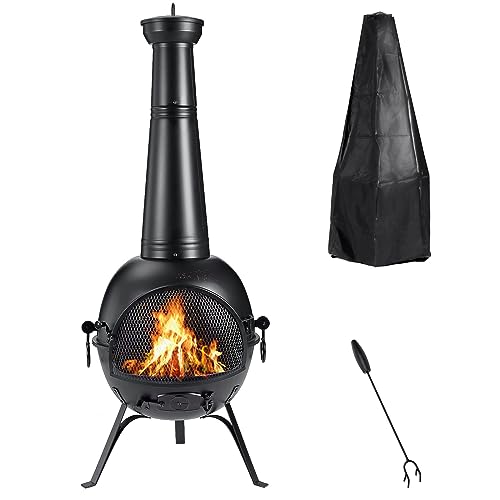What's The Job Market For Chiminea Fireplaces Professionals?
페이지 정보

본문
 chiminea fireplaces (Express-page.com)
chiminea fireplaces (Express-page.com)Fire pits are great, but chimineas offer an entirely new perspective to fire pits in the backyard. These unique outdoor fire places are art pieces, providing warmth and ambience for your family gatherings.
 Chimineas must be kept in a safe place and should not be placed directly beneath any material that could ignite. They should be kept away from rainy conditions.
Chimineas must be kept in a safe place and should not be placed directly beneath any material that could ignite. They should be kept away from rainy conditions.Safety
It's important that you take safety precautions, no matter what type of fire feature you have in your backyard. Both chimineas as well as fire pits could produce hot sparks that can cause burns. Both emit a plume that could contain pollutants, such as secondhand smoke. Be sure that the area around the chiminea doesn't contain anything combustible. Also keep the chiminea clear from trees or eaves which could catch fire. Additionally, it's best to wear a protective garment when working with a chiminea particularly if you intend to cook food with it.
Both chimineas, and fire pits, can provide warmth, entertainment and a focal point to your outdoor space. However they differ in terms of aesthetics and lifestyle requirements. Fire pits provide a more dramatic experience and can be a great match for many different styles of design. Chimineas have a rustic more traditional appearance which is ideal for smaller gardens. They also require more maintenance, as they tend to release more smoke than fire pits, and require regular ash cleanup.
In terms of environmental impact, chimineas release less particulate pollution than traditional wood-burning fire pits because they burn smoky, dryer, and better-seasoned wood and result in less emissions per usage. Both kinds of fire pits, however, can release a significant amount of air pollutants in the form of smoke that contains a range of toxic chemicals.
When constructing an e-chiminea, ensure to use only wood that is seasoned and to keep the burning flames to a minimum. It's also a good idea to put an electrical spark arrester made of mesh on the top of the chimney. A spark arrester will help minimize the production of unwanted sparks that could ignite grass fires or spread the flame to nearby combustible materials. It's a good idea to avoid extinguishing a chiminea with water because the sudden change in temperature can cause cracks in clay, terracotta or metal.
Both fire pits and chimineas are best used on an area that is fire-proof, such as pavers, concrete, brick, or slate tiles. The ideal chiminea should be at least ten feet from any structure or other combustible material. It is a good idea to purchase a hose as well as a water container for homeowners so that they can quickly put out any fires that might occur.
Style
Although fire pits are becoming increasingly popular and may be the most popular option for outdoor fire features, chimineas are still popular with homeowners. They can be a great option to bring rustic or mexican chimineas feel to your garden or patio, and they can also provide warmth in the cooler seasons. The size of your outdoor area and the kind of fuel you'd like to use will determine whether you go with an chiminea or a firepit.
Chimineas are available in a variety of styles, from the classic terra-cotta round design to more modern metal options. Some even allow you to burn gas instead of wood and are a great alternative when the weather turns cool or it's just too windy for an open fire.
The base of the traditional chiminea is hollow and holds the firewood. This wood is fed from the front. The chimney neck extends upward directing smoke up and away from the house to prevent drafts and to reduce the amount of soot that would otherwise end up in your food items or on you while cooking.
Chimineas made from clay and terra-cotta may be damaged if they become too hot, and therefore they should be placed in areas that are protected from the elements. Cast iron and steel chimineas can be able to withstand heat, however they are heavy and difficult to move.
A wood-burning chiminea can be a great addition to your patio, particularly when you have plenty of open space to put it. It is important to keep in mind that chimineas need plenty of space to smoke, so it is important to place them away from other structures or seating areas to prevent damage and prevent ash from blowing into people's faces.
There are chimineas that is made of metal or clay. It can be painted or appear natural. If you choose metal chimineas, they is likely to come with a protective coating that assists to repel rust. Some models come with a contemporary black finish. You can pick a model that has a natural patina of rust. This occurs when the metal is exposed.
Fuel
With a broad base that taper to a narrow chimney, chimineas provide the perfect focal point for smaller patios. With a variety of materials and intricate details they enhance the appearance of any deck or backyard providing warmth and ambience to any outdoor living space.
Contrary to traditional fireplaces with wood burning which release a significant deal of smoke and can pose health risks, chimineas are engineered to minimize the amount of smoke that is released. Their enclosed design and upward-directed chimney helps reduce smoke, thereby reducing environmental issues and nuisances from neighbors. This is particularly important if you live in an urban area where smoke pollution can cause problems for neighbors.
Chimineas are generally designed to burn seasoned or treated wood, but you can also find models that accept charcoal and propane gas to provide a variety of cooking options. If you opt to burn fossil fuels such as coal, you'll have to be aware of the fuel you use to ensure it doesn't release too much smoke.
As with fire pits, Chimineas can vary in size, but there are designs that work with standard logs and even larger pieces of wood for grilling purposes. Certain chimineas come with features such as a rain cap, grilling grate or screen to shield the chimney from falling sparks and other debris. Some models, like this one from Bali Outdoors include a screened opening and an iron poker to ensure the fuel is ignited safely.
Whether you prefer more of a rustic or contemporary aesthetic, there's sure to be a chiminea to match your style. The majority of chimineas have a traditional style however, you can find models with painted or incised details. Some manufacturers, such as the Blue Rooster Company, which makes our top choice, offer conversion kits that convert chimineas burning wood to gas-powered models.
The choice of the right chiminea is crucial to have a pleasant and safe experience in the garden. Assess your space, your aesthetic preferences and lifestyle needs to determine which chiminea is best suited to you. Be sure to prioritise safety features and maintenance requirements when you shop and think about your budget to ensure you can enjoy your chiminea all year round.
Maintenance
Although chimineas are simple to use, they require some care to ensure their long life and safety. Cleaning your chiminea regularly will prevent the accumulation of ash and debris which could cause fire hazards and structural damage. Regular cleaning improves the appearance of your outdoor fireplace and rustic charm.
Gas models can be converted to burn propane or natural gas. When using a gas chiminea, it is crucial to keep the chimney free of any flammable substances like leaves and twigs to avoid carbon monoxide poisoning. It is also crucial to only use dry well-seasoned wood in your gas chiminea because treated or painted materials release harmful chemicals when they are burned.
It is recommended to line the clay biggest chiminea's bottom with pea gravel or rock sand. This will stop the clay from cracking when heated by a large fire. It is also advisable to put a slate or metal stack cover on top of the chiminea to shield it from rain. Chimineas are designed to be 'cured' or broken in slowly by beginning small fires and then growing in size over time. After three to four small fires, your chiminea will be ready to handle large logs.
It is important to be mindful of local laws regarding burning when using your chiminea. When there is a drought, you must be extra cautious because the smoke from your chiminea could cause neighbors to become angry or ask whether you'd like to put out the flames.
Chimineas made of clay and steel are both susceptible to breaking or cracking in the event of weather that is too cold or too hot. However steel structures are more likely to rust and develop corrosion than chimineas made of clay. Buying a high-quality, durable chiminea can ensure that your outdoor fireplace will last for a long time to be.
When using your chiminea, it is recommended that the grate is filled with approximately 3 inches of pea gravel to prevent the fire from spreading too quickly and creating a fire hazard. It is recommended to put your chiminea in a place where the wind patterns will take the smoke away from your home and not into it, as the constant stream of toxic fumes could cause issues.
- 이전글8 Tips To Up Your Pragmatic Slot Tips Game 24.11.14
- 다음글10 No-Fuss Ways To Figuring Out Your Window Replacement Aylesbury 24.11.14
댓글목록
등록된 댓글이 없습니다.

